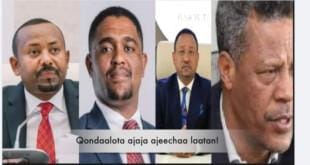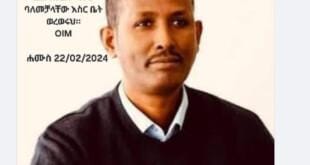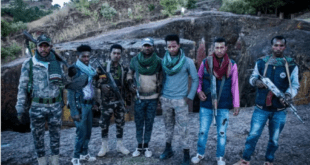Review Overview
The Oromo nationalists seem to be legitimately so quick to accuse and judge certain fellow Oromo individuals, who seem to work with the Abyssinians, as being politically on the wrong side and to be possibly guilty of commision. We sometimes denounce such fellow Oromo as being collaborators, betrayers of our objective and even paint them as criminals, who did atrocities against the Oromo nation. Then, all who are denounced like this usually be denied the recognition regarding their talents, which we would have respected irrespective of the fact to whom service they applied their talents. Who were/are actually the targets of such judgement of ours? Let’s look at our history and our status quo in short for this may help us to act correctly in order to achieve our desired future destiny. Before proceeding in my writing, let me operationally define two important words (innocence and guilt) to be used in this essay. Innocence is a term used to indicate a general lack of guilt, with respect to any kind of crime, sin, or wrongdoing. In a legal context, innocence refers to the lack of legal guilt of an individual, with respect to a crime. Guilt is a cognitive or an emotional experience that occurs when a person realizes or believes – whether justified or not – that he or she has violated a legal or moral standard, and is responsible for that violation. There can be a situation where a person can be found guilty by others, including the justice institution, but the person may not feel it emotionally or accept it cognitively.
Regarding our history, we tried to accuse and vilify some of the prominent Oromo individuals, who were part and parcel of the empire building. Here to make my position clear, I am not the supporter or fan of these Oromo individuals, but I just would like to recommend that we better recognize and accept some of them, specially the non criminals, at least as strong and talented Oromo nationals, who only played their game in a wrong club. It is not my intention to declare that they are either innocent or guilty because of their actions, but I do appeal to all Oromo at least to recognize their ability and talent. Let’s look at the soccer profis as a good metaphor. I personally know two national players in Germany, who are originally from Poland, their names being Klose and Poldolski. Few years back (I don’t remember whether it was in European or world compitition), German national club played against Poland and it was Poldolski who made his historic goal to make Germany a winner against Poland. After that there was a discussion among Poland’s politicians on the question: who is wrong for the fact that this talented man from Poland could play for Germany instead of for his mother- or fatherland? Was it the fault of the player? Was it the fault of Poland’s politicians? Was it the fault of his parents? Was it the economy that was stu*pid?…..etc. Fault finding after fault finding took place, but with no avail to correct the lose for Poland.
Who ever did the fault, the fact was that the talented Poland citizens played against Poland for the advantage of Germany. This is a classical example to be used to explain the reason for condeminig the talented Oromo individuals who played a political game in the club of the Habesha against the Oromo. It is fact, which we can not deny, that these Oromo individuasls were/are talented, but they played/are still playing in a wrong club. So the above mentioned politically talented Oromo and a lot of others in history also played for the Habesha against the Oromo. We know the main motive of the soccer players is the money they do earn, but what was and is the motive of the Oromo individuals in the wrong political club? The temporary financial gain or some other life advantages? If so, then it can be simply put as an opportunism. Otherwise who was responsible for their choice of the club for whom to play? Was it only the political conviction and the understanding they had, for some didn’t know the viability of Oromia and might have thought their only country was Ethiopia? Well the previous politicians in history might have thought so, what about those serving Habesha today? Is it may be for they are the mentally enslaved part of the Oromo national body as a result of the subjugation we endured in the last about 150 years? Or, who really did the fault so that our talents could serve the Habesha political club instead of the Oromo club? Mind you, there were/are also a lot of Oromo talents serving Habesha club in other fields like language, art and sport.
I think the politics of the empire in the last 300 years, till the Woyane took power in 1991, was seemingly under the domination of some Oromo including the Amharinya speaking Oromo. The main mistake these Oromo elites did seems to be their action of promoting and using Amharinya as a national language, neglecting or even oppressing Afaan Oromo. Why did they do that? May be, was it similar to the action of the German royal family, who used to speak French rather than German language, giving more value to a foreign language in order to show their own status of power or “better human quality” in comparision to the ordinary citizens? I do have my own thesis: some Oromo groups seem to have accepted and developed Amharinya since 1270 in relation to their acceptance of the Holy Book which has been written in Ge-ez; so they fostered Amharinya as the new language out of Ge-ez and Afaan Oromo; then it was given a moral upper hand being the language of both the clergy and the royality; the Oromo elite, who accepted the religion and such royality revered Amharinya at the cost of Afaan Oromo; Many Amaarinya speaking Oromo seem to be the products of such process; being the carriers of this moral upper hand, Amharinya speaking Oromo groups started to feel superior to others and then tried to “civilize” their Afaan Oromo speaking siblings south to them.
It is historically recorded that very few soldiers from Tigrai or Semien came to invade Oromia, but mainly the “gallant” Oromo (both Amharinya speakers and Afaan Oromo speakers) being led by Minilik II and Gobana Daacee did the invasion. They promoted Amharinya and Orthodox religion at the cost of Afaan Oromo and Waaqeffannaa. Simply put they promoted Amhara club. Amharas and Tigreans being the semetized nations of the Kush peoples are then called to be Habesha (Abyssinians). Language rather than biological heritage being the main part of a national identity, this made the above mentioned Oromo nationals in history to be considered as those who played in a wrong political club (for the Habesha against the Oromo). Now we can see that based on the different languages they do speak (not necessarily based on their biological origin), there is a development of different national groups (e.g. Amhara nation, Tigrean nation and Oromo nation). Accordingly, not only in history, we also see today that there are a lot of talented Oromo playing in the Habesha political club against Oromo’s national interest. Nowadays the Habesha forces fighting against the right of the Oromo to self-determination are devided in to two: the Amhara domination forces and the Tigrean hegemonist forces. Related to this, we also see a lot of talented Oromo politicians playing their political game in either the Amhara club or the Tigrean club.




